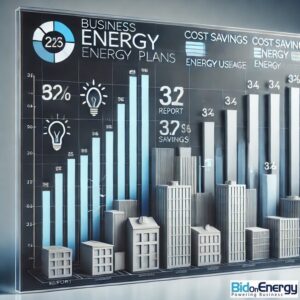How to Choose the Best Business Energy Plan
Choosing the right energy plan for your business is essential to controlling operational costs and optimizing energy efficiency. With various types of plans and providers available, it can be difficult to determine which option best fits your company’s needs. A well-chosen plan can lead to significant savings, while the wrong one may cost you more in the long run. Thankfully, tools like Bid On Energy make it easier to find and compare the best business energy plans, ensuring you make informed decisions that benefit your bottom line.
1. Types of Business Energy Plans
Understanding the different types of business energy plans is the first step in finding the right one for your company. Here are the main options available:
- Fixed-rate plans: With a fixed-rate plan, you lock in a set price per kilowatt-hour (kWh) for a specific period, typically ranging from one to three years. This offers protection from market price fluctuations, giving your business stability and the ability to budget more accurately. Fixed-rate plans are ideal for companies that prefer predictability in their expenses.
- Variable-rate plans: A variable-rate plan allows your electricity price to change based on market conditions. While this can sometimes lead to lower costs when energy prices drop, there’s a risk that rates will rise, especially during peak demand times or market volatility. This plan may suit businesses that can tolerate some price variability or want to take advantage of potential savings during off-peak periods.
- Green energy plans: More companies are opting for green energy plans that provide power from renewable sources like wind, solar, or hydropower. Choosing a renewable energy plan can reduce your company’s carbon footprint and may even qualify you for tax incentives or rebates. Additionally, as consumer and business partners become more eco-conscious, using green energy can enhance your company’s reputation.
2. Key Factors to Consider When Selecting an Energy Plan
To ensure you select the best energy plan for your company, there are several important factors to consider:
- Energy usage: The first step is understanding how much energy your business uses. Review your recent energy bills to identify patterns in your consumption, such as peak hours and months of higher demand. This data will help you choose a plan tailored to your usage levels, ensuring you’re not overpaying for energy you don’t need.
- Contract length: Business energy plans typically range from short-term (1 year) to long-term (3+ years) contracts. Long-term contracts often come with lower rates, but they lock you into a specific price for a longer period, which can be a disadvantage if market prices drop. Short-term contracts provide flexibility but may have higher rates. Consider your business’s growth and future energy needs before committing to a long-term plan.
- Flexibility: Some energy plans offer flexibility to adjust your contract as your business evolves. This might be particularly important for businesses experiencing growth, as they may require more energy down the road. Look for plans that allow you to scale your energy consumption without incurring hefty penalties.
- Supplier reputation: Beyond price, consider the supplier’s reputation for customer service and reliability. A low-cost energy plan is only beneficial if the supplier provides consistent service and responsive customer support. Be sure to review customer feedback and supplier ratings when choosing a provider.
3. How to Compare Business Energy Plans
To get the best energy deal for your business, it’s essential to compare multiple suppliers and their offers. Here’s how to do it effectively:
Step 1: Gather usage data
Start by collecting your business’s energy bills from the last 12 months. This gives you a clear picture of your typical energy consumption and peak demand periods, which is critical for suppliers when they generate a quote tailored to your needs.
Step 2: Use comparison tools
Instead of spending hours manually reaching out to suppliers, you can use platforms like Bid On Energy to quickly compare multiple energy providers. Bid On Energy allows you to submit your usage data and receive competitive quotes from trusted suppliers, making it easier to evaluate the best options for your company.
Step 3: Review contract terms carefully
While it’s tempting to focus solely on price, it’s important to carefully review each plan’s terms and conditions. Look out for hidden fees, early termination penalties, and whether the supplier has automatic contract renewals that could lock you into higher rates if you don’t renegotiate on time.
4. How to Make the Switch to a New Business Energy Plan
Switching business energy providers or plans can seem overwhelming, but the process is simpler than you might expect. Here’s how to ensure a smooth transition:
Step 1: Notify your current supplier
Before making any moves, check the terms of your existing contract to see if there are penalties for switching early. If your contract is near its end or the terms allow for an easy exit, notify your current supplier of your intention to switch.
Step 2: Work with the new supplier
Your new energy provider will typically handle most of the switching process, including contacting your old supplier and ensuring there’s no disruption to your electricity supply. The transition is seamless, and your business won’t experience any downtime.
Step 3: Monitor the first few bills
After switching to your new plan, monitor your first few bills to ensure that everything aligns with the terms of the new contract. Verify that the rates are accurate and reflect any promised savings.
5. How Bid On Energy Simplifies the Process
Navigating the complexities of business energy plans doesn’t have to be time-consuming or difficult. Bid On Energy streamlines the process, offering a one-stop platform to compare energy plans and get quotes from multiple providers. Here’s why businesses should consider using Bid On Energy:
- Efficient comparison: With Bid On Energy, you don’t need to individually research each energy provider. The platform allows you to submit your business’s energy usage and get customized quotes from various suppliers, helping you find the most competitive deal.
- Cost-effective solutions: Bid On Energy works with a wide range of energy suppliers, ensuring that you have access to the best rates and plans that match your business’s size and energy consumption.
- Expert support: The platform offers expert guidance throughout the process, from comparing quotes to switching providers, ensuring a smooth transition with no disruptions in service.
Selecting the best business energy plan is vital for controlling costs and optimizing your company’s energy usage. By understanding the types of plans available, comparing offers, and using tools like Bid On Energy, you can make informed decisions that benefit your business in the long run. Regularly reviewing your energy plan ensures that your business is always getting the best deal possible, whether through cost savings, green energy options, or flexible contract terms.
Ready to find the best energy plan for your business? Let Bid On Energy help you make the switch today.

